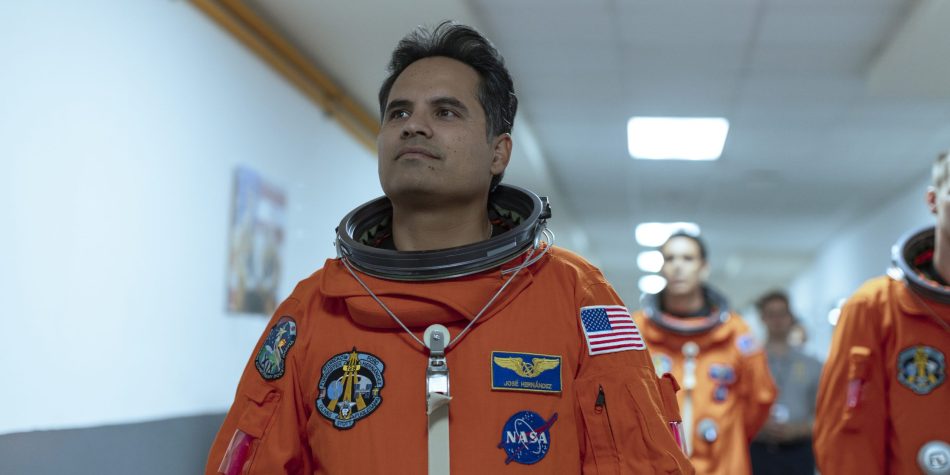In recent years, American society has witnessed the meteoric rise of therapy culture, a phenomenon characterized by an emphasis on emotional validation, self-affirmation, and a psychological understanding of ourselves and others. This trend toward viewing people through a psychological lens has been particularly notable in film.
This culture, while offering solace to many, has also been critiqued for fostering a sense of perpetual victimhood and an over-reliance on external validation. Some have suggested that this culture may be due for a backlash.
Enter center stage “A Million Miles Away,” a film directed by Alejandra Márquez Abella. The film follows José Hernández, the son of migrant farm workers, on his journey to become an astronaut. It is a film that triumphs in the human spirit and the support system that makes it work. A film’s quality is practically defined by its ability to help us diagnose its characters
Director Abella’s earlier films, “Northern Skies Over Empty Space,” “The Good Girls,” and “Semana Santa,” all take a kind of sidelong glance at their characters. Yes, she consistently speaks to the importance of family and culture, as she does again here. But her previous works unsettle and keep her audience off balance. In comparison, at first glance, “A Million Miles Away” is quite conventional. But Abella’s astute eye for absurdity finds expression in her careful dissection of our popular therapeutic culture. Hernández has aspirations that soar beyond the confines of his immediate environment. The film’s focus on him emphasizes resilience, hard work, and personal agency.
The 1950s and 60s saw a surge of films that delved into the human mind, often portraying characters trapped by their past traumas or neuroses. Hitchcock’s “Vertigo” is a prime example, where the protagonist’s acrophobia and obsessive love are central to the narrative. Such films, while groundbreaking, often presented a deterministic view of human behavior, suggesting that individuals are prisoners of their subconscious drives. This portrayal, while offering a deep dive into character complexities, also risked disempowering characters, painting them as mere puppets of their psychological afflictions. Films such as “Peeping Tom,” “The Manchurian Candidate,” “Repulsion,” “Suddenly, Last Summer,” as well as much of Hitchcock’s work, typify this trend.
The end of the twentieth century doubled down on this psychological view while offering relief through therapeutic interventions. The film “Good Will Hunting” delved into the life of a young janitor at MIT trapped by past traumas but who unlocked his potential with the power of therapy. Films such as “Ordinary People,” “Girl, Interrupted,” and “Antwone Fisher” all follow this basic narrative. Even films that didn’t directly address therapy still relied on the hallmarks of therapeutic culture to resolve the problems of psychologically understood characters. Films such as “Dead Poets Society,” “The Breakfast Club,” and “Stand By Me” reflect this trend.
“Clueless,” the adaptation of Jane Austen’s “Emma,” reflects this trend especially well. Whereas Emma is guided by society’s norms and manners, Cher navigates her landscape with teen angst, therapy-speak, and self-help mantras. Both Emma and Cher have realizations about their own shortcomings. But Emma’s are rooted in her understanding of the world around her, while Cher’s are rooted in her understanding of herself.
The psychologicalization of drama has reached a point where a film’s quality is practically defined by its ability to help us diagnose its characters.
Over the last 25 years, this trend has only continued. Film and television such as “Eternal Sunshine of the Spotless Mind,” “Sopranos,” “Silver Linings Playbook,” “Breaking Bad,” “Inside Out,” “BoJack Horseman,” “This is Us,” and “Ted Lasso” all deeply involve themselves in the psychological reading of characters and how therapeutic interventions help them (or could have). Even our largest pop spectacles imbue these issues into their stories. Iron Man, Black Widow, and Winter Soldier all have trauma as major parts of their storylines. Thor, Captain Marvel, and Black Panther all deal with identity crises presented in deeply psychological ways. And the Hulk, well, he’s practically a Sigmund Freud fever dream.
The crowning film of the saga even included a support group for Captain America.
By contrast, “A Million Miles Away” sees the world through a very different lens. José Hernández is not presented as the product of his mind but of his family and community. He overcomes his obstacles not with therapeutic interventions but by rejecting them (sometimes explicitly.)
The film begins with a poignant scene set against the backdrop of a cornfield, with the song “California Dreaming” playing in Spanish. This scene sets the tone for José’s journey beginning in the fields of the central valley. As José navigates the complexities of his life, from the early mornings working in the fields before school to the teasing he endures for his accent, he consistently rejects the idea of seeing himself as a victim.
This resilience comes in large part from his father. José’s relationship with his father is central to the narrative. In my sit down with José, he described his father as providing the “tough love” in the family, setting high expectations for his children. This is evident in the film, where his father’s stern demeanor integrates with moments of genuine care and concern. José recalls his father’s unwavering expectation, “Thou shalt finish high school.” This expectation, combined with his mother’s nurturing love and emphasis on education, becomes the foundation for José’s ambitions.
As the narrative unfolds, José’s journey is punctuated by challenges that could easily have made him a poster child for therapy culture. Yet, at every turn, he chooses resilience over resignation.
In the schoolroom scene, when José’s teacher stands up against his classmates who mock him for his accent, José doesn’t seek emotional validation. Instead, he responds with a simple yet profound question to his teacher: “What are stars for?” This isn’t just a query about celestial bodies; it’s a reflection of his aspirations and a subtle rejection of the idea that he should be defined by his immediate circumstances.
When the film does brush up against therapeutic tropes, such as José expressing frustration over constantly being reminded of his parent’s sacrifices, his father retorts, “Then get stronger.” Films such as “October Sky,” “Tree of Life,” or “Indiana Jones and the Last Crusade” used the trope of the emotionally distant father to establish a psychological struggle for the protagonist to overcome. By contrast, in this film, José follows his father’s advice.
His cousin Beto’s rejoinder to José that “you sold your soul for a bowl of Doritos,” helping him refocus on his community, and meeting his wife Adela, are the preparatory steps for his journey of success—not coming to some deeper realization about himself or his psychology. It’s a morality play, but it’s not an oversimplified one
When Adela, José’s wife, discovers he’s been applying to NASA secretly, the screenplay evinces no curiosity about why he’s been hiding this but rather is interested in Adela’s encouragement that he continue.
The births of each of his five children are presented not as barriers to his own self-actualization but rather as additional pieces to the family structure that supports him.
José told me he wanted it to be “a film about a person being successful because of the support around him, his family, his parents, his community around him.”
This film is not a character study, as so much of today’s cinema is. It calls on a deeper kind of art, a fable, or a morality play. This story is meant to teach you something.
Alejandra Márquez Abella divides the film into five sections. Each begins with a title card describing the next “ingredient” in the recipe for success. This didactic approach may feel off for many modern audiences who want to draw their own individualized lesson from every piece of art. Abella is instead interested in teaching her audience a true lesson about the nature of success.
Other reviewers have complained that Hernandez comes across as a saint. But this isn’t quite right. He comes across as the personified virtue of persistence and hard work, such as was common in morality plays. And of course that looks good, that’s the purpose of the film. But it doesn’t shy away from the difficulties and sacrifices of persistence, especially borne by those around him. Yes, it’s a morality play, but it’s not an oversimplified one. To pull off such a feat while still creating believable and engaging characters would require exceptional actors, and fortunately, Michael Peña and Rosa Salazar, who play the leads in the film, deliver grounded performances that don’t rely on the psychological tropes we’ve become used to in defining characters.
Films like “A Million Miles Away” play a crucial role in our cultural landscape, offering perspectives that challenge and diversify dominant narratives. It’s certainly too soon to know if we are indeed in the early stages of a pushback against the excesses of therapy culture. But if we are, it would look exactly like “A Million Miles Away.”
“A Million Miles Away” premieres on Amazon Prime on September 15, 2023.
















